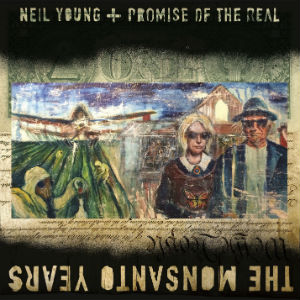On the surface, The Monsanto Years looks like another concept album nobody asked for, like Living With War or Fork In The Road. Whatever the subject matter, it’s only going to work if the music can rise to the occasion. For the most part, the album does. His co-conspirators this time are Promise Of The Real, a combo featuring two of Willie Nelson’s sons, who provide a sloppy, Crazy Horse-style backing. (Think Mirror Ball, which was recorded with Pearl Jam, but with more musical variety.) Lukas Nelson takes most of the lead guitar breaks, and he’s definitely been influenced by his frontman, while brother Micah occasionally puts a bow to the neck of his own Gibson.
Wisely, the album starts with a more universal message in “A New Day For Love”, followed by the Harvest Moon-style strum of “Wolf Moon”. Neil’s voice is more cracked than ever, trying to hit notes he’ll never get. “People Want To Hear About Love” acknowledges the resistance he’ll likely face for these songs, and here’s where the brand names start to pile up. “Big Box” doesn’t feel like eight minutes here, balanced as it is with cool changes and a few hooks.
“A Rock Star Bucks A Coffee Shop” is a happily stupid stomp with a whistled theme, while “Workin’ Man” comes from another part of the same barn. “Rules Of Change” breaks up the tirade with some welcome poetic metaphors, Neil harmonizing against his own creaky voice. “Monsanto Years” is played in two keys, both too high for Neil to sing, and this is likely where dissenting ears will have had enough. Which would be their loss, as “If I Don’t Know” closes the program with a more personal, less political rumination, framing the album nicely.
The best thing about The Monsanto Years is the band, who support him ably, but one gets the impression they’re pretty tickled to be smoking weed with their grandpa. Neil’s stable of go-to musicians had been fighting losing battles with mortality lately, and while we’re still waiting for our phone to ring, it’s good that he’s looking for a musical spark outside of his norm. However, a little condensing, time to polish, and much less repetition would have helped keep it from being written off as another distraction.
Neil Young + Promise Of The Real The Monsanto Years (2015)—2½

No comments:
Post a Comment